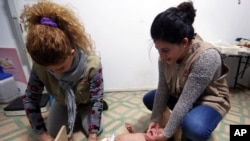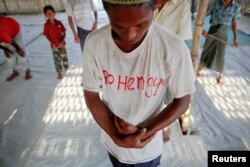The U.N. refugee agency said a global 10-year campaign launched one year ago to end statelessness is making progress, but not enough.
An estimated 10 million people have fallen through the cracks and are not considered citizens of any country. They are stateless, and as such are denied benefits that come with a birth certificate and a nationality.
The UNHCR reports a child is born stateless at least every 10 minutes.
Assistant High Commissioner for Protection Volker Turk told VOA a stateless child will grow up with his or her aspirations for a meaningful life frustrated. He said statelessness takes a serious psychological toll and undermines a child’s self-esteem.
“They are trapped in a bit of a vicious circle ... because they compare, obviously, themselves with others. And they do not understand, 'Why is it that the person who looks just like me is a national, can go to schooling without problems, can go to health care services without problems, and I cannot. What is different?” said Turk.
Stateless young people also face discrimination, stigmatization and harassment, and are more vulnerable to exploitation, the UNHCR reports.
Possible solution
Statelessness exists on all continents. People sometimes become stateless when a country dissolves, as happened in the former Soviet Union or when a new country is born, such as South Sudan. Gender discrimination also plays a role, many states do not allow a mother to confer her nationality upon her child.
Volker Turk said statelessness can be resolved.
“For instance, in Cote d’Ivoire, in the Ivory Coast, you had a statelessness problem in the past, which was resolved through the adoption of a nationality law. It also shows if you have an interest and the political will, you can actually resolve them by granting nationality to people who have been habitually resident in that country for a long time,” said Turk.
The UNHCR urges all states to ensure universal birth registration, to allow mothers to pass on their nationality to their children, and eliminate laws that deny children nationality because of their ethnicity, race or religion.





